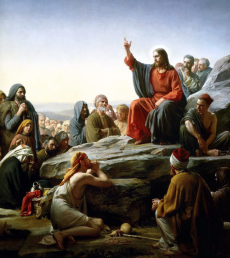
When many people today think of Jesus they often imagine him to go about in a passive manner being nice to people and never really offending anyone. However, if we look at what was actually written about him in the four gospels of Matthew, Mark, Luke and John, which are found at the start of the New Testament in the Bible, we see a very different illustration of Jesus to the one just mentioned.
First of all, it is indeed true that Jesus spoke a lot about love, telling those around him in Mark Chapter 12, Verse 31 (12:31), to “love your neighbour as yourself”. This sounds straight forward enough; you should place as much value on the lives of those around you as you do your own. But in Matthew’s gospel we see Jesus go one step further, when he says to his followers, “I tell you, love your enemies and pray for those who persecute you” (5:44).
This is altogether a more difficult teaching to keep to – one that might well have attracted controversy and opposition at the time, as it sometimes does today. This is understandable – for what reason should you have positive feelings for someone who probably wishes to do you harm? It seems to go entirely against our concept of what is fair. As the famous atheist Christopher Hitchens said in 2009, “…the idea that you ought to love [your enemies] is not a moral idea at all. It is a wicked idea.”
However, others would point out that Jesus was creating a higher standard of morality, one which mankind had not yet imagined, for, as Jesus himself pointed out, there is nothing particularly hard about loving those who love you: “if you greet only your own people, what are you doing more than others?” (Matthew 5:47) Jesus’s teachings on love are therefore far more challenging than one might suppose.
Jesus was also someone who, despite being commonly called a rabbi – a teacher of Jewish scripture, went around Galilee criticising the actions and words of the other rabbis and Jewish elders. In the four gospels Jesus uses the term “hypocrite(s)” around 20 times and much of the time he is referring to them. He tells the teachers that, while they may rightly give one-tenth of their possessions, they have also forgotten “the more important matters of the law – justice, mercy and faithfulness.” (Matthew 23:23)
And there are multiple occasions in which he accuses them of focusing far too much on religious rituals. On one occasion when some teachers of the law ask Jesus why he and his followers were eating without having given their hands a ceremonial washing beforehand and he responds by saying provocatively that they “have let go of the commands of God and are holding on to human traditions” (Mark 7:8).
But the event that most puts to death the image of Jesus as mild, passive or pacifistic is when he drives out the merchants and traders from the Temple in Jerusalem, saying, “Do not make my Father’s house a house of trade.” (John 2:14-16) In John it is even written that Jesus made a whip out of cords to get the merchants and traders to leave.
So, though Jesus spoke a lot about love (and peace) he was not afraid to challenge, even offend, others, defy tradition and tell people where to go.
Image: Carl Heinrich Bloch [Public domain], via Wikimedia Commons

0 Comment:
Be the first one to comment on this article.